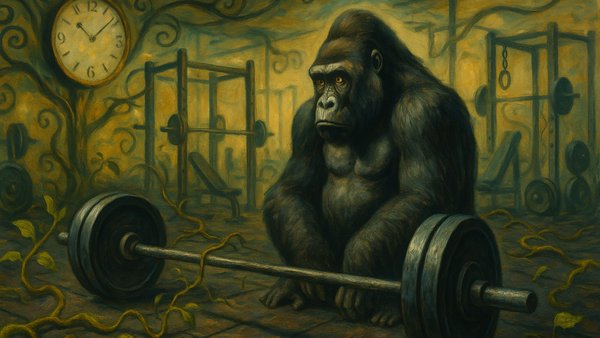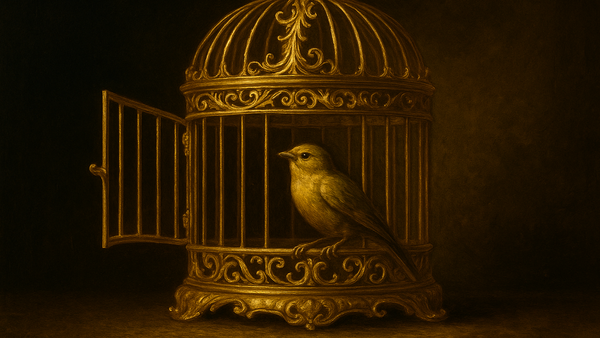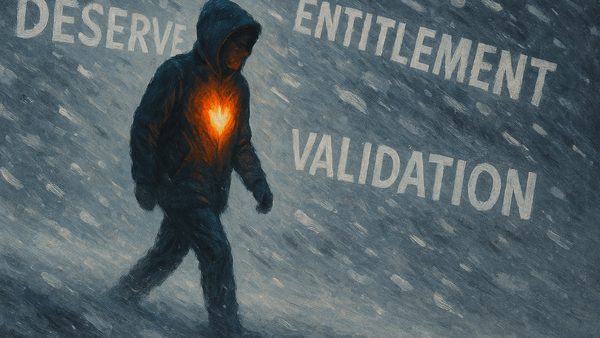There Is No Luck
The bipolar categorization of your life's events into good and bad luck leads to misery. Learn to grow your awareness to live a happy life.

Luck is the belief that success or failure—some fortunate or unfortunate event—may happen at any time by random chance. It implies that perceived positive or negative events happen without any action or effort from your side.
Every single day a myriad of things that could be classified as fortunate or unfortunate happen to you, whether you notice them or not. In fact, if you look closely, you realize that your whole life consists of a constant string of events of which every single one could be categorized as fortunate or unfortunate.
The only relevant question in this context is how you should respond to this string of events and which attitude you should take towards it.
The Perception of Luck
Any event can only manifest as fortunate or unfortunate if we identify it as such and give significance to it. An event of good luck to occur requires appreciation. An event of bad luck to occur requires a collapsing of one’s consciousness into shame, guilt, grief, fear, or anger.
Imagine yourself crossing a busy street on your way to the supermarket. You’re in a rush. You’re walking at a fast pace, repeatedly glancing left and right for approaching vehicles. While pinning your gaze to the exit of the parking lot to avoid getting run over by a car you take the final leap to the other side and miss the curbside just by a hair’s breadth. You stumble but manage to catch yourself. Adrenaline rushes through your body. You realize that you didn’t hit your toe, that you didn’t break your foot, that you didn’t hurt yourself in any other way. A sense of relief washes through your body. What good luck this was!
Nevertheless, aren’t we just talking about one step here, the single one you consciously appreciated? What about the other steps you’d taken that day and what about all the other things that didn’t cause any harm to you on your way to the supermarket? Bird droppings, reckless cyclists, moving cars splashing water from puddles, trucks steered by overworked and sleep-deprived drivers, traumatized dogs that have been let off leash, or careless children with sticky ice cream cones. Unless you appreciate the significance of the present moment that attributes to your success or well-being there is no good luck.
Similarly, there is a constant stream of unfortunate occurrences that happen to you unnoticed. When you attempt to enter the supermarket, you find the automatic revolving door is broken, so you take the manual door. The type of yogurt you usually get is sold out, so you substitute with a different one this time. The register you’re approaching is out of service, so you just switch lines. You’re not the first one in the line, there’re three other people in front of you. When you want to pay by credit card, the cashier tells you that your card provider is not accepted in this store, so you just pay cash. You pack all your groceries and once back home you notice that one of the eggs is broken in the package (but you still have enough to prepare all the meals you planned). Unless you let these circumstances cause you to submerge in shame, guilt, grief, fear, or anger, there is no bad luck to be found.
If you don’t notice it, is a fortunate event good luck, is an unfortunate event bad luck?
Good and bad luck is nothing but the symptom of how we choose to experience the world. It is merely a matter of perception. Because only our awareness, our ability as sentient beings, allows us to define luck. Consequently, whether or not you are a lucky person is a matter of choice.
This becomes even clearer if we add the dimension of time to the above considerations. As conscious and sentient beings we have the ability to retroactively classify an event of the past as good or bad luck.
‘Fortunately, I didn’t marry this man.’
‘Unfortunately, I didn't buy that apartment when the prices were low.’
‘Luckily I had missed that train that got into the accident.’
‘What bad luck that I caught gonorrhea on that one occasion during vacation.’
Classifications like this build on new intelligence we constantly gather and new occurrences between the given event and the present moment. This process never ends as our perception of Now continuously moves through time and space. We cannot know the entirety of implications a specific event has on our lives further down the line. A perceived fortunate event can lead to unfortunate events and vice versa.
Every single event moves in a constant flux of manifesting as fortunate or unfortunate, depending on your personal perception and level of awareness. In other words, any event may be both good and bad luck simultaneously—or none at all.
Becoming Lucky
In most modern societies—and probably in most ancient societies as well—there seems to be an emphasis on unfortunate events. This is most likely because only unlucky people can be exploited effectively. Only because your life is filled with unfortunate events do you allow the government and society to employ regulatory measures upon you. Only because your life is filled with bad luck—with shame, guilt, grief, fear, and anger—do you allow others to sell material remedies to you to soothe your self-imposed suffering.
Isn’t the mere fact that life was given to you in itself worth appreciation? And if anything that follows is just events without classification, what remains is you. And when it’s about time and death knocks on your door to take your life, there’s nothing you can possibly lose that wasn’t given to you in the first place.
How to break out of cycles of seemingly bad luck? The only way is to raise your awareness in such a way that you become able to realize the insignificance of so-called bad luck as well as the significance of good luck that happens around you. This requires any form of meditation on the one hand and on the other hand the disassociation from people or media that attempt to distort your perception, to carry bad luck into your life to exploit you.
Stop categorizing your life as good and bad luck, it makes you miserable.
Actions Create Luck
Yes, having a car accident on the way to the supermarket because you chose to take the SUV for convenience could be considered an unlucky event. But if you survive, isn’t that a lucky event? Is it bad luck if you break your leg or good luck because you only broke your leg?
Everything happens in the context of cause and effect. Regardless of whether you believe in coincidence or providence. Everything that happens to you or with you has a cause. And guess what? The most important cause is your perceptions, decisions, and actions.
In the scenario of the car accident, who’s decision was it to drive the car? And didn’t you know or research that there’s a certain chance for you to have a car accident the moment you start the engine?
If you meet Dwayne ‘The Rock’ Johnson—or any fitness idol of yours—in the gym and happen to make such a good impression on him that he offers to mentor you and coach you personally which results in a drastic lifestyle change of yours which leads to fame and fortune, this could be considered a fortunate event. But who was it to decide to go to the gym in the first place? Who was it to develop so much bravery, determination, and character to befriend your idol? And who was it who decided to seize the moment and take their best shot? But if you didn’t dare to approach them, wouldn’t that be an unlucky event because you never had the chance to talk to get in touch? Or is all of that just the result of your own actions?
It makes no sense to attribute luckiness or unluckiness to events that happen in your life. Any event is just an identifiable point in the fabric of spacetime where uncountable threads, consisting of chains of infinite causes and effects, interweave. Your only responsibility is to give your best shot when it comes to making decisions.
Luck and Responsibility
How can you be free if you believe that success or failure may come to you at any moment at random chance? If you believe in luck, you cannot be free. Because in essence, you deny the responsibility for your contributions to the infinite amount of circumstances the fabric of causes and effects consists of. Any of your choices of perception and action have consequences, in every single moment of your existence. No matter if those consequences are obvious or subtle, if they manifest instantaneously or deferred.
Take responsibility for your life and liberate yourself. It’s you who shapes your destiny. It’s your own beliefs and your own faith that brings good or bad luck, that makes you lucky or unlucky.
When someone tells you good luck, this doesn’t mean that you shall abandon responsibility. It rather means that you should have faith in your abilities, in God if you will, and do everything you can to give your divine gifts to the world.
If you believe in God and live a life aligned with the precepts of your religion based on insight and understanding, without resistance to what manifests in your life from moment to moment, your life will be filled with good luck. Similarly, if you don’t believe in God, but live according to your very own precepts to which you hold yourself accountable and accept their consequences, entirely and unabashedly, and if these chosen precepts truly serve yourself and others, your life will be filled with good luck.
In both cases not because you were lucky. But because your beliefs and actions made you lucky.
Shadows of Luck
There is another layer to be aware of when people talk about luck that usually lies in the shadows. When something is called luck, most often subtler intentions and beliefs lie beneath the surface of communication.
Calling something unlucky
- in your own life often manifests as blame and victimhood,
- in someone else’s life often manifests as pity.
Calling something lucky
- in your own life often manifests as disrespect for your efforts,
- in someone else’s life often manifests as envy and devaluation.
The perception of luck and its classifications are not just a major source of misery and unhappiness and make you vulnerable to all kinds of exploitation from external forces, they also foster destructive human personality traits.
Symbols of Luck
Finally, a word about the purpose of symbols that are believed to bring good or bad luck. Many of such symbols are indeed connected to the likelihood of fortunate or unfortunate events to occur within their sphere. Without denying that some of those symbols might actually attribute to the causes for success or failure (e.g. walking under a ladder or throwing rocks at a whirlwind), most of them are rather a display of the symptoms of certain effects your behavior entails (e.g. tipping a salt shaker over, finding a four-leaf clover or an albatross seen by sailors).
In other words, if you behave in a certain way, you are more likely to elicit a desirable or undesirable event. And some events are an admonition for your current behavior and level of awareness.
By the way, the world record for finding the most four-leaf clovers is held by Edward Martin Sr. of Cooper Landing, Alaska, with 160,000 specimens.
That being said, the most important function of symbols of luck is to support sharpening one’s awareness. They focus your attention on the occurrence of either fortunate or unfortunate events. Even more, one does not just become aware of certain events that would otherwise have remained obscured, symbols of luck can also make you unconsciously and involuntarily contribute to the occurrence of such events. So, in a way, their effects can indeed become a reality for you.
A black cat crossing your path may prime your awareness to notice events of bad luck, while touching a chimney sweep may prime your awareness to notice events of good luck.
Carrying or witnessing a symbol of good luck may support the believer to move up from the lower levels of consciousness like shame, guilt, grief, fear, or anger, in which the capacity of his mind is inhibited and his perception narrow. His mind may become calmer, his level of awareness higher and he therefore tends to experience success more prominently, even if nothing changed from an external point of view.
Similarly, a symbol of bad luck may drag the believer down to lower levels of consciousness. His mind may become more agitated, worried, and anxious, and he therefore tends to experience failure more prominently. He even tends to act in a way that supports the occurrence of events he’d classify as unfortunate. Because our perception creates our reality.
If you struggle with your awareness of the enjoyable and positive events in your life, you can indeed use a talisman or amulet—an item you wear or carry—that you assign the ability to attract good luck to. An item that helps you to calm your mind and heighten your spirit. Just be aware that you make yourself vulnerable to creating an attachment to a physical object for your well-being.
Use such symbols as long as you need to, and when you’re ready, let go of them and make your own luck.
Did you enjoy this article? Please consider contributing to this publication’s financial freedom.
Flows straight into content, not coffee.




